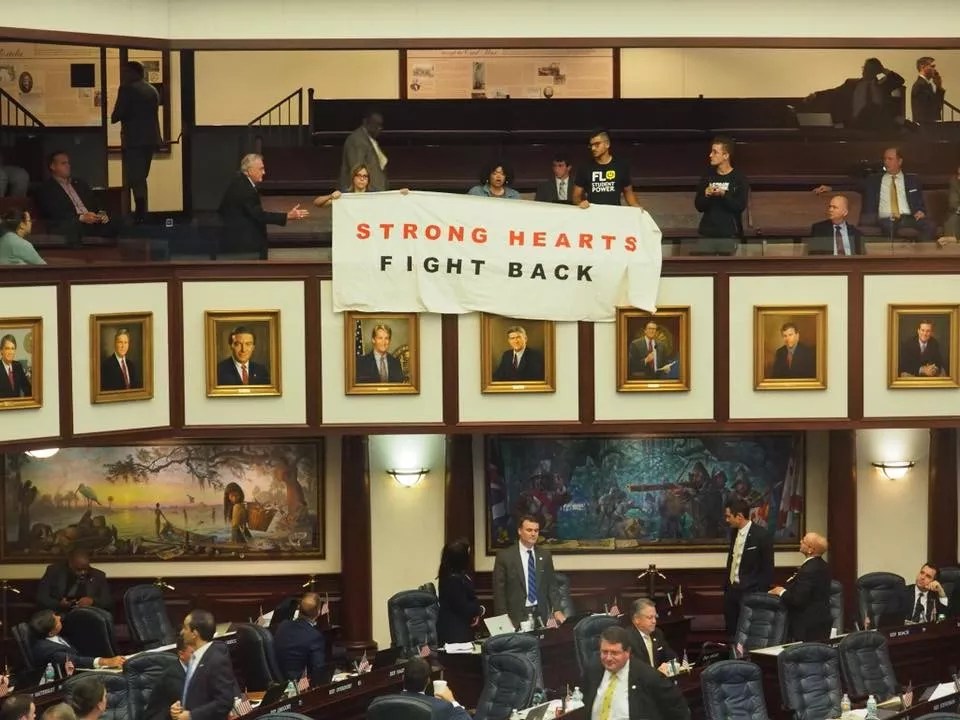
Photo by the Florida Immigrant Coalition

Audio By Carbonatix
Florida’s next legislative session doesn’t begin until January, but already, lawmakers have filed dozens of bills with the potential to drastically change the way things are done here in the Sunshine State.
Over the past couple of weeks, New Times has reported on newly filed legislation that could affect women’s health, LGBTQ protections, and immigrant rights. To date, more than 500 bills have been introduced by state lawmakers.
With that in mind, here are five recent bills to watch out for in the upcoming legislative session:
1. A recently filed bill would ban abortion after six weeks, criminalizing the procedure:
State Rep. Mike Hill – a man who claims God speaks to him – filed the legislation, known as HB 271. The bill would effectively ban all abortions in Florida after six weeks and remove all exceptions, including instances of rape and incest, or if a woman’s life was at risk if the pregnancy were brought to full term.
The bill would also make abortion a felony in the third degree, which is punishable by up to five years in prison. It’s unclear if the law would apply to patients or only to abortion providers. As currently written, the bill says that “any person who willfully performs, or actively participates in, a termination of pregnancy” would be in violation of the law.
As state lawmakers return to Tallahassee this week to jockey over priorities for the 2020 legislative session in January, Hialeah Rep. Cindy Polo is taking square aim at the contentious anti-sanctuary law, which was forced through by Republican lawmakers in May at the behest of Gov. Ron DeSantis.
A new bill filed this week by Polo, a Democrat, would largely unravel the ban, known as SB 168, which requires local and state law enforcement officials to cooperate with immigration agents looking to pick up any jailed undocumented people. Polo’s bill would not only prohibit local officials from working with U.S. Immigration and Customs Enforcement (ICE), but also block them from stopping, arresting, or detaining individuals based solely on immigration status.
Polo filed the same bill earlier this year, only to see the Republican-led charge against undocumented immigrants pass through the Legislature and the governor’s mansion. The bill, which she originally intended to be proactive, has instead become reactive and, according to Polo, holds even greater importance now that Republican lawmakers are gearing up to pass additional anti-immigrant measures in 2020.
3. A different piece of legislation would pause evictions during hurricanes and other emergencies:
One of the highest-profile evictions in the leadup to Hurricane Dorian involved longtime Miami Beach resident Maria Cazañes, who was thrown out of her home by Miami-Dade Police days before the hurricane made landfall. County Mayor Carlos Gimenez later said the eviction was a mistake.
Regardless, the case prompted two state lawmakers – Rep. Michael Grieco and Sen. Jason Pizzo – to file companion legislation to pause all eviction proceedings during emergencies such as a hurricane. Alana Greer, cofounder and codirector of the Community Justice Project, says those protections are vital.
“An eviction during a hurricane is really a due-process issue,” she says. “It’s really an important next step for the Legislature to act to protect tenants, especially in times like a hurricane.”
4. A House bill would protect against discrimination based on sexual orientation and gender identity:
Florida is one of 26 states lacking a law protecting LGBTQ people from workplace discrimination, meaning employees can be fired from their jobs simply because they are gay or trans. There’s also no rule that prohibits discrimination in housing, service, public accommodations, or even healthcare. An attempt to reform the law and prohibit discrimination – the Florida Competitive Workforce Act – was quashed in 2016. Current legislation in the Florida House would reform the state’s Civil Rights Act of 1992 to include sexual orientation and gender identity, but it also provides a backdoor for adhering to the law by keeping religious exceptions.
The only protections for Florida’s LGBTQ community come at the local level. For example, Miami-Dade has a countywide ordinance that forbids workplace discrimination.
State Rep. Bobby DuBose, a Fort Lauderdale Democrat, this week filed a House bill that would remove the “clean hands” provision of the Victims of Wrongful Incarceration Compensation Act, which bars compensation for people with prior felony convictions. The bill won’t be retroactive, DuBose tells New Times, but he hopes it will right some wrongs moving forward.
“At the end of the day, the fact that the state wronged someone with a prior conviction doesn’t remove our culpability from what we’ve done,” he says.
When the act was signed into law in 2008 with then-Sen. Arthenia Joyner leading the charge, wrongfully imprisoned people with any previous felony convictions were exempt from compensation. In 2017, the Florida Legislature unanimously passed a bill that amended the act to exclude those priorly convicted of only violent felonies or multiple nonviolent felonies. Of the 35 states that compensate wrongfully incarcerated people, Florida is the only one with these caveats. DuBose’s bill seeks to eliminate them all.